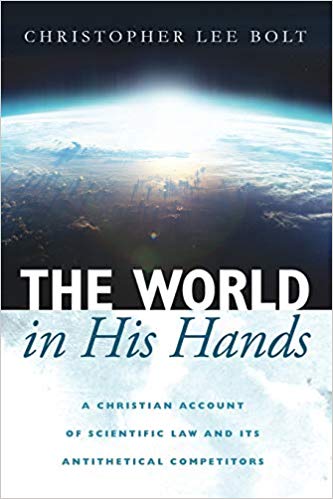A Book Review from Books At a Glance
By Robert C. Newman
The author’s doctoral dissertation at Southern Baptist Theological Seminary, this work covers a wide spectrum of thought in philosophy, theology and science. It discusses the biblical doctrine of providence, here defined as “that action of the Creator to concurrently preserve the existence, nature, and behavior of his creation and to govern it toward its purpose, goal and end” (5). Its main thesis is to provide “a philosophical account of the Christian doctrine of providence and its implications for the laws of nature and problem of induction before arguing that Christian theism is thus better equipped to provide a basis for science than are secular and Islamic worldviews” (xvii).
Chapter one deals with the matter of divine providence. Does this consist of God acting alone (non-concurrent theistic preservation and government)? This view was espoused by Christian philosopher and theologian Jonathan Edwards, among others. The author sketches some serious problems with this suggestion. For many, the claim that God recreates everything at every moment (so there is no continuity of natural things) is its most problematic feature. Another view is that in providence, after God has created, natural things act alone (non-concurrent cosmological preservation and government). This, for example is characteristic of deism, a view especially popular in the 18th century, but not dead yet. After noting problems with this view, Bolt concludes that the biblical view is concurrent theistic-cosmological preservation and government, citing Colossians 1:16-17, Hebrews 1:3 and Acts 17:22-28 as especially relevant in this regard.
Chapter two notes some scientific implications of providence in theology, in apologetics, and in science. In theology, Bolt notes that “Laws of nature are … rather difficult to establish in the context of other world religions… the laws of nature fit well with and are implied by a Christian view of divine providence” (46). In apologetics, various apologists have sought to put together arguments for Christianity based upon the implications of providence for science. Bolt discusses a number of these. He looks at Greek science (which I think he somewhat underplays), and the lack of science in animism, Buddhism and Hinduism. In his treatment of Islamic science, he notes its derivative character from Byzantine science, and later (in chapter 5) will note the destruction of science in Islam (198-216). In science, the author notes “If the quality and quantity of scientific discovery is any guide to discerning whether or not a worldview possesses a successful approach to science, then pagan, polytheistic, pantheistic, Buddhist and Islamic approaches are obviously flawed” (80). He cites Albert Einstein, Antony Flew and Paul Davies, among others, concerning the influence of Christian ideas on the rise of science.
Chapter three deals with the character of laws of nature. Are these merely regularities, as David Hume and many of his successors claim? Can mere regularity explain apparent causation, just because causation is invisible? Aren’t the phenomena of nature too complex and too consistent to be merely regularity? Another suggestion is that the laws of nature are logical (or metaphysical) necessities: this is the way things have to be, just as two plus two must equal four. The author comes down for a third alternative: that laws of nature are necessities, but they are natural necessities, not logical necessities. That is, God has given natural things their characteristics, and he could easily have given them different characteristics in a different world, as perhaps he will in this world after the resurrection. This chapter is pretty heavy going for non-philosophers (as I am), due to its use of philosophical jargon.
Chapter four deals with the problem of induction. Bolt explains how deduction works and how this differs from induction. He notes that Hume raised a serious problem for induction, as this method of study and explanation depends upon the future being like the past. But how do we know that the future will be like the past except by induction? Induction is certainly a procedure that has worked well, both in science and in everyday life, but Hume asks how is it to be justified? Why should one expect the future to be like the past? Bolt notes that neither David Hume’s skepticism nor Karl Popper’s falsifiability solves this problem of justifying induction. Bolt ends the chapter by noting that the Christian doctrine of God, who is both Creator and Provider (as in providence, above), gives believers the assurance that the future will resemble the past. God is faithful, and though we know he will one day bring things to an end, his world is dependable and consistent, so that his human creatures can study it as part of their commission to rule over the earth and its inhabitants.
The fifth chapter deals with some further issues. What is the difference between God’s ordinary providential activity and his miraculous deeds? How does Islam differ from Christianity in its view of God and what difference does this make for induction and doing science? Can we say that the Christian worldview is the only one that justifies the activity we call science?
A helpful and thought-provoking discussion. Most readable for those with some background in philosophy, theology and science.
Robert C. Newman is Emeritus Professor of New Testament and Christian Evidences at Biblical (now Missio) Seminary, Director Emeritus of the Interdisciplinary Biblical Research Institute, and a Fellow of the American Scientific Affiliation.
